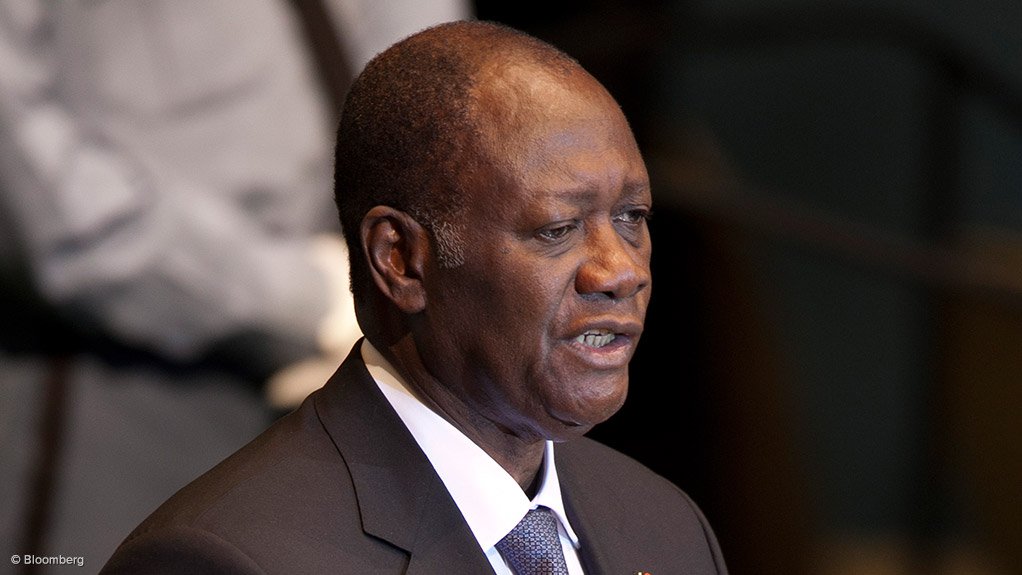Alassane Ouattara's long path to becoming Ivory Coast president included two elections in which he was disqualified from running and a brief but brutal 2010-11 civil war spurred by his predecessor's refusal to leave office.
Things have been easier since he took the top job in 2011, with landslide re-election wins in 2015 and 2020.
The 83-year-old former international banker hopes to replicate the feat for a third and potentially final time when West Africa's biggest cocoa producer goes to the polls on October 25.
Ouattara's supporters say his success at the ballot box reflects voter satisfaction with strong economic growth since he took office and a flurry of infrastructure projects, from new roads and interchanges to a more than 300-metre tower that dwarfs everything else in the city centre skyline.
His critics say it has just as much to do with restrictions on democratic activities, including what Amnesty International criticised on Thursday as a "disproportionate" ban on election-related protests.
The man who analysts say would be Ouattara's biggest challenger, former Credit Suisse chief executive Tidjane Thiam, has been excluded after a court found he had French nationality when he registered, which is not permitted under Ivorian law.
Ouattara's predecessor Laurent Gbagbo is barred because of a prior conviction.
Those who are allowed to contest do not have the backing of the country's major political parties, hindering their ability to mobilise on a large scale, analysts said.
Instead, the four opposition candidates are heading up "makeshift coalitions" and are divided among themselves, said Cesar Flan Moquet, director of the Centre of Political Research of Abidjan, a think tank.
"All this means that these candidates do not really have a chance," he said.
TURBULENT RISE TO THE TOP
Born in Dimbokro in central Ivory Coast on January 1, 1942, Ouattara received a doctorate in economics from the University of Pennsylvania, then rose to deputy director of the International Monetary Fund.
He later became prime minister under founding President Felix Houphouet-Boigny, whose death in 1993 ushered in a more toxic period in Ivorian politics.
New electoral rules, including one requiring candidates to have lived in Ivory Coast for the previous five years, prevented Ouattara from running in the 1995 election.
He was excluded again in 2020 on the grounds that one of his parents was from Burkina Faso. Gbagbo, who won that election, called Ouattara "a candidate for the foreigners".
A 2002 rebellion against Gbagbo split the country in two, leaving its northern half in the hands of rebels, many of them from Ouattara's Dioula ethnic group.
The war was largely a result of xenophobic policies by successive Ivorian governments against migrant farmers from Burkina Faso and Mali that also targeted northern Ivorians with cultural ties to them.
For the 2010 election, Ouattara formed a pact with former President Henri Konan Bedie which helped secure his victory in the runoff against Gbagbo.
Fighting that erupted after Gbagbo rejected his defeat killed around 3 000 people before Ouattara was sworn in in April 2011.
Ouattara coasted to re-election in 2015 and 2020, though the latter vote was marred by clashes between rival supporters that killed 85 people.
UNCERTAINTY OVER WHO COMES NEXT
Tensions do not appear to be running as high as in 2020, when critics were more agitated over Ouattara's argument that a new constitution approved in 2016 had reset his two-term limit.
The protest ban and the deployment of 44 000 security forces to prevent unrest will help stave off large-scale unrest, said West Africa political risk consultant Jessica Moody.
Ouattara is likely to spend a fourth term focused on economic targets, including making Ivory Coast a middle-income country by 2030, bringing a new Abidjan metro online and improving roads and electricity access.
There is also the question of who comes after him, which he tried to answer before the 2020 election by naming then-Prime Minister Amadou Gon Coulibaly as his successor.
Coulibaly died several months later, and Ouattara went back on his promise to hand power to a new generation.
Choosing a new successor will be a thorny process given divisions within the ruling party, but it is not impossible, Moody said.
"I don't think he lacks the motivation to stand down," she said. "He will be 88 by the next election."
EMAIL THIS ARTICLE SAVE THIS ARTICLE ARTICLE ENQUIRY FEEDBACK
To subscribe email subscriptions@creamermedia.co.za or click here
To advertise email advertising@creamermedia.co.za or click here











